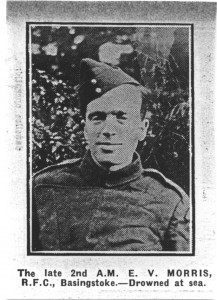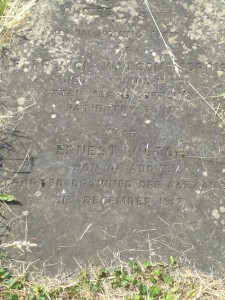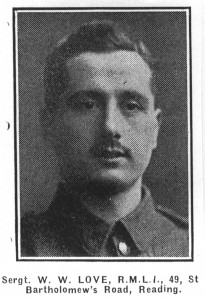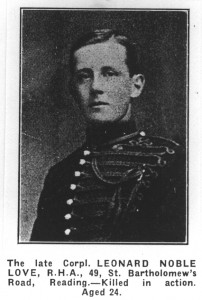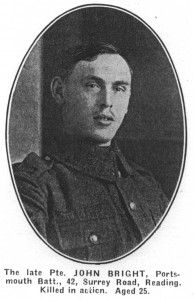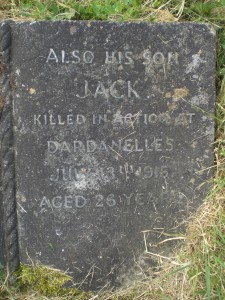William Walter Love M.M.
Sergeant -Major Royal Marine Light Infantry
Royal Naval Division
Leonard Noble Love
Corporal 52805
“B” Battery Royal Horse Artillery
Division 52
William Walter Love and Leonard Noble Love are commemorated on the grave of their parents, Mary and William Robert Love and also on the St. Bartholomew’s Church memorial. At the time of their deaths the Love family were living at 49, St. Bartholomew’s Rd. Reading. The 1901 census indicates that Mr William R. Love, aged 39, was already a widower. William Love’s widowed mother and sister were living with the family which comprised five children, four boys and one girl at 12, Mancherst Road. WilliamR Love was a carpenter and joiner by trade.
William Walter Love was described in the 1911 census as a bicycle engineer. He was killed in action on Oct. 26th 1917 aged 23. He was the third son of Mr. W.R. Love. He had served with the Royal Naval Division throughout the Gallipoli campaign. His death was reported in the Standard November 17th 1917.
The 26th October 1917 marked the beginning of the Second Battle of Passchendaele. The German front line was hit with shell fire along its length for four days preceding the start of the battle. Due to the naturally high water table and broken dykes the battlefield was largely a sea of mud. The Royal Naval Division attacked on the left hand side of the Canadians who were attacking Bellevue Ridge, they gained some ground but with heavy losses. It is probable that William Walter Love was amongst them. Serjeant Major Love has no known grave and is commemorated on the Tyne Cot Memorial Panel 1 and 162A.
It has not been possible to find the citation for his Military Medal.
Leonard Noble Love was the second son of Mr. Love. Leonard served 6 years (8 years in one report) in the regular army. The 1911 census indicates that Leonard Noble Love was born in 1891 and was then aged 20. He was in Z Battery RHA. He was serving in Egypt,Sierra Leone, South Africa and Sudan.
Leonard Noble Love was mentioned in dispatches in Sir Charles Monroe’s Gallipoli dispatch. A report in the Chronicle 2nd July 1915 was an extract from a letter sent to his father on 11th May 1915.
“I am writing this in a trench with the rain pouring down, hoping that it will soon cease, as it is not very comfortable. We have been in action since 27th April. Our troops are making progress in the right direction. We had rather a big night attack on the 1st May, but things ended up alright in the finish. Since then we have advanced. We get very good rations, and plenty of them, which is a great thing, as one always feels better after a good meal. I am glad to say that the rain did not last long this morning; the weather is perfect. Things are rather quiet this morning , and have been so for the last two or three days. There is the usual spasmodic burst of shrapnel and rifle fire.
“I have seen one of the most thrilling sights of my life -that was the bombardment of the forts by the Navy. For about three days it was like a tremendous thunderstorm. Buildings were changed into heaps of dust, big guns were dislodged from their mountings, and, to sum up the whole thing, the Turks were ‘none too happy.’ It is a great thing to see the way our infantry behave, and to see them charge is a great sight.
“ I got in rather a tight corner on the night of the 1st May but managed to scrape through all right. While I am writing there is a howitzer battery engaging a turkish battery, and what I can see they are smashing it up.”
Unfortunately he was killed in action on January 6th 1916, the day before the last of the army was finally evacuated from Gallipoli. (Chronicle July 21st 1916) He also has no known grave and is commemorated on the Helles Memorial Panel 21 and 22.
Mr. Love’s youngest son Lance Corporal Fred Love enlisted with the Royal Berkshire Regiment served in France from March 1915.
